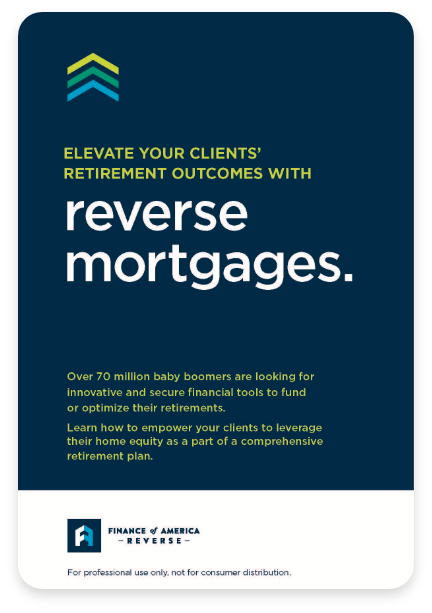Name: Charlene K.
Age: 72
Home Value: $650,000
Potential Loan Amount: $360,000
A reverse mortgage line of credit withdrawing $40,000 per year for 10 years* while retaining home equity.

By clicking on this link, you are leaving the website of Finance of America Reverse LLC (“FAR”). These links are provided for convenience and informational purposes. They do not constitute an endorsement or recommendation by FAR of any products, services, or opinions offered or expressed on this site. This site may have terms and conditions and privacy policies that differ from those of FAR.
Browse on-demand resources and strategies designed to help your clients improve retirement with home equity.

Learn how a reverse mortgage fits in as part of a client’s comprehensive retirement strategy.

Name: Charlene K.
Age: 72
Home Value: $650,000
Potential Loan Amount: $360,000
A reverse mortgage line of credit withdrawing $40,000 per year for 10 years* while retaining home equity.

Name: Martin S.
Age: 62
Home Value: $750,000
Potential Loan Amount: $368,500
Retirement Savings: $1,300,000
A reverse mortgage line of credit on his home to pay the taxes on his Roth conversions, allowing for tax-free growth* and distributions for the rest of his life. His heirs will inherit the Roth income tax-free as well.

Name: Sarah S.
Age: 66
Home Value: $525,000
Potential Loan Amount: $288,225
A reverse mortgage line-of-credit to supplement her cash flow, allowing her to delay taking Social Security and maximize the benefit.

Yes. The borrower still retains ownership of the home and may sell it at any time with no prepayment penalties. The home is simply secured with a lien similar to a traditional mortgage or home equity line of credit.
There is never a required principal or interest payment during the life of a reverse mortgage loan. Homeowners are still required to pay property-related expenses, including taxes, insurance, and HOA fees.
Generally, the loan balance is due after the last borrower permanently moves from the home or passes away.
The borrower’s heirs may sell the home and keep any remaining equity if they wish, or refinance with a traditional mortgage if they want to retain the property. In the event the loan exceeds the value of the property, the heirs can choose to walk away via foreclosure with no responsibility to the remaining balance.
Yes, reverse mortgages are non-recourse loans, which means the lender can only look to the subject property for satisfaction of the mortgage lien. The borrower and/or heirs are never personally liable for satisfaction of the reverse mortgage.
FAR’s proprietary products can offer borrowers loan amounts up to $4 million.
Yes. The home can be in a trust, revocable or irrevocable, provided the trust meets FHA trust guidelines.
This amount is generally based on the home’s value, prevailing interest rates, and the age of the youngest borrower or eligible non-borrowing spouse.
Reverse mortgages are only available on the borrower’s primary residence, which can be a single-family home or up to a four-unit dwelling.
However, there are no restrictions on the use of reverse mortgage proceeds. As long as borrowers continue to meet the occupancy requirements of the loan, they may use their proceeds as part of a secondary property purchase.
The borrower is responsible for all property-related expenses, including taxes, insurance, and HOA fees.
No. All reverse mortgage proceeds are considered loan proceeds and not subject to income tax.
Borrowers must be at least 62 for an FHA-insured reverse mortgage and 60 (where applicable by state law) for a lender-specific product, including FAR’s proprietary solutions. Younger spouses can remain on the property title but cannot be on the loan.
The terms of the loan remain the same as long as one borrower remains in the home.